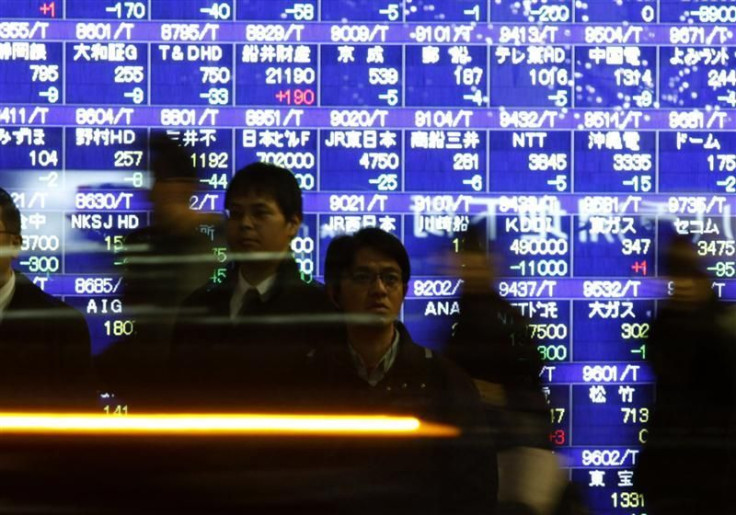Asian Shares Hit 2-Month Highs on IMF Bid to Aid Europe

(Reuters) - Asian shares rose to a two-month high and the euro firmed Thursday after news that the International Monetary Fund was seeking to boost its resources to tackle the euro zone debt crisis helped ease worries about Europe's funding difficulties.
Smooth debt sales by Portugal and above-estimate earnings from Wall Street powerhouse Goldman Sachs Group Inc (GS.N) added to the positive mood, just as investor risk-aversion had started to weaken after assets posted gains early in the new year.
Recent data has suggested the euro zone's problems have not seriously derailed global economic activity, though the continent's rapidly cooling growth is clearly weighing on Asia's export-reliant economies. Reports from the U.S. overnight showed factory output growing at its fastest pace in a year.
The MSCI's broadest index of Asia Pacific shares outside Japan <.MIAPJ0000PUS> rose 0.9 percent to a two-month high, with financials <.MIAPJFN00PUS> and materials sectors <.MIAPJMT00PUS> among the top performers as base metals such as copper climbed to a four-month high.
Japan's Nikkei average <.N225> rose 1.3 percent, hitting a five-week high.
Markus Rosgen, head of Asia strategy at Citigroup in Hong Kong, said the recent resilience in equities suggests a rebalancing from last year's extreme risk-aversive stance, which could leave fund managers underperforming if prices kept rising.
Global growth environment may be not great but it is not disastrous either. Equities are pricing in a pretty bad environment, but the environment is not as bad as the prices suggest, he said.
Current mid-cycle valuations in Asia are at a level justifiable only if there were a global recession, Rosgen said.
Now and then, there will be de-risking but by and large, most people are still too bearish on global growth, he said.
The IMF is seeking to more than double its war chest by raising $600 billion in new resources to help countries deal with the fallout of the euro zone debt crisis, but the United States and other countries are balking, saying Europe must put up more of its own money.
U.S. stocks jumped to their highest since July on Wednesday, with the benchmark Standard & Poor's 500 Index .SPX closing above a key resistance level of 1,300.
Goldman Sachs shares rose about 7 percent as its earnings exceeded analysts' expectations.
Australian employment suffered a surprise fall in December for the second straight month of decline, raising the prospect for more interest rate cuts. The data also showed full-time employment actually rose in December while the jobless rate stayed at 5.2 percent. The Australian dollar fell to a session low of $1.0376.
GREEK TEST
Greece, striving to avoid bankruptcy by restructuring its debt, kept hopes alive that a deal could be struck to grant the cash-strapped country much-needed funds, although the uncertainty surrounding the negotiations remained a big risk to markets.
International creditors and the Greek government are haggling over the interest rate that Athens will offer on new bonds and its plan to enforce private investor losses.
Investors will also face more tests to their risk tolerance later on Thursday when Spain and France tap the markets with longer-dated debt offers.
So far, debt sales in the euro zone have gone off without a major hitch in the wake of Standard & Poor's mass downgrade of euro zone sovereigns last Friday.
Portugal, the only country in the euro zone apart from Greece that is rated at junk level by all the major rating agencies, on Wednesday sold all of its planned issuance of treasury bills, while Germany's auction of two-year bonds drew strong demand.
The euro steadied at $1.2861, holding above $1.2624 hit last week, its lowest since late August 2010.
Given that several risks lie ahead, investors are likely to view this current short squeeze as an opportunity to re-enter short euro positions, analysts at BNP Paribas wrote in a client note.
The ample funding operations by the European Central Bank removed fears of an imminent credit crunch in Europe, easing dollar-funding market and reducing the safe-haven demand for U.S. Treasury bills, which for the first time in seven weeks were sold at an interest rate above zero on Wednesday.
Overall recovery in risk helped improve Asian credit markets, with spreads on the iTraxx Asia ex-Japan investment grade index narrowing by 4 basis points.
(Additional reporting by Ian Chua in Sydney; Editing by Richard Borsuk)
© Copyright Thomson Reuters {{Year}}. All rights reserved.





















